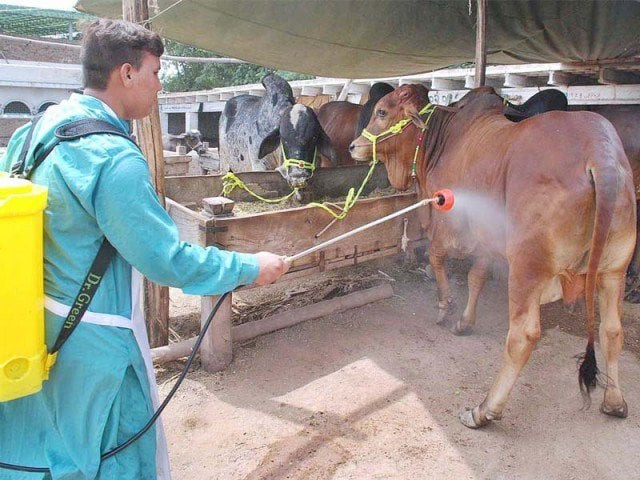NIH issues Congo Fever, typhoid advisory
Urges public to undertake precautionary measures against both diseases

PHOTO: APP
The public and the healthcare authorities — for both humans and animals — has been advised to take precautionary measures to avoid any fatal infections.
The Field Epidemiology & Disease Surveillance Division (FEDSD) at the National Institute of Health (NIH) on Wednesday issued an advisory regarding prevention and control of the Crimean-Congo Hemorrhagic Fever (CCHF) ahead of Eidul Azha. It noted that prevention was their best bet since no vaccine is currently available for the disease and the only way to reduce infections is by raising awareness. The advisory notes that areas, where domestication of animals is very high, can be affected by this disease.
As cows return to cities, Congo fears rise
Last year, Pakistan saw as many as 51 positive cases of the Congo fever.
Since the beginning of this year, a total of 59 suspected cases of the virus have been submitted for testing at the NIH, of which eight were found to be positive for CCHF, the institute said.
The NIH warned that healthcare workers along with animal herders, veterinarians, para-veterinary staff, livestock workers, animal merchants, butchers and slaughterhouse workers are most at risk from the disease.
Apart from them, close contact with animal caregivers and those involved in burial practices are also at risk of being infected.
The advisory explained that CCHF is a disease caused by a tick-borne virus (Nairovirus) of the Bunyaviridae family with a case fatality rate of 10–40 per cent. Ticks, especially of the Hyalommagenus, are both reservoir and vector for the CCHF virus. Numerous wild and domestic animals, such as cattle, buffaloes, goats, and sheep are silent carriers of this virus and the adult ticks feed on these animals.
The health institute advised those at risk to wear protective clothing (including long-sleeved shirts and long trousers), wear light-colored clothing during a visit to the animal market so that ticks can be easily detected on the clothes and regularly examine clothing and skin for ticks; if found, remove them safely; and use approved repellents on clothing and skin.
It warned of crushing the ticks and suggests to wear gloves and other protective clothing while handling animals or their tissues, notably during slaughtering, butchering and culling procedures in slaughterhouses or at home.
It also asks the public to avoid close physical contact with CCHF-infected people, wear gloves and protective equipment when taking care of ill people, wash hands frequently after caring or visiting ill people and use insect repellents.
The NIH further advised adopting safe burial practices if anyone infected with the virus passes away.
Typhoid Outbreak
Following the recent spell of rains, the NIH has also issued an advisory regarding the increased number of typhoid fever cases.
It said that a new form of typhoid fever has emerged, one which is extensively drug-resistant (XDR Typhoid) and it is being reported from different areas of the country, especially from some areas of Sindh, including Hyderabad and Karachi.
It added that thus far, more than 2,000 positive cases of XDR Typhoid have been reported so far in the country, though no deaths have been reported. A number of cases of typhoid have been reported from the twin cities of Islamabad and Rawalpindi as well. It has prompted international agencies and organisations to ask their employees to take precautionary steps against the disease.
But it is not clear whether cases in the capital are drug-resistant because no tests were conducted to diagnose it further.
As tests are being conducted in Sindh, none of the cases in the capital has been diagnosed, said Mumtaz Ali Khan, an epidemiologist at NIH.
Citizens warned against Congo virus
The typhoid fever usually spreads during the summer and monsoon season. The NIH said that typhoid is caused by a bacteria (SalmonellaTyphi) which occurs through the faecal-oral route and spreads through contaminated food, milk, frozen fruits and water or through close contact with an already infected person.
Contamination is mainly caused by poor sanitation and mixing of sewerage in drinking water.
The advisory suggests to adopt preventive measures in routine life to avoid such kind of infections: washings hand properly and restore hand hygiene condition in routine life, avoid eating raw food and vegetables, always drink boiled drinking water.
Published in The Express Tribune, August 16th, 2018.



















COMMENTS
Comments are moderated and generally will be posted if they are on-topic and not abusive.
For more information, please see our Comments FAQ